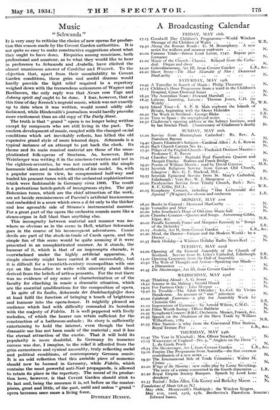Music " Schwanda "
IT is very easy to criticize the choice of new operas for produc- tion this season made by the Covent Garden authorities. It is not quite so easy to make constructive suggestions about what they ought to have done. Enquiries among musicians, both professional and amateur, as to what they would like to hear in preference to Schwanda and Arabella, have elicited the almost unanimous answer of Cardillac and Wozzeck. To the objection that, apart from their unsuitability to Covent Garden conditions, these grim and sordid dramas would hardly provide the light relief required in a repertory weighed down with the tremendous seriousness of Wagner and Beethoven, the only reply was that Neues own Tage and Johnny spielt calf ought to be done. I fear, however, that at this time of day Krenek's negroid music, which was not exactly up to date when it was written, would sound oddly old- fashioned, while Hindemith's journalism would hardly provoke more excitement than an old copy of The Daily Stunt.
The truth is that " grand " opera is no longer being written except by composers who are still living in the past. The modern development of music, coupled with the changed social conditions which art inevitably reflects, has killed the old expensive grand style of more leisured days. Schwanda is a typical instance of an attempt to put back the clock. Its theme and its main musical material are those of the unso- phisticated folk-operas of Smetana. As, however, Herr Weinberger was writing it in the nineteen-twenties and not in the eighteen-seventies, he was not content with the simple harmonic idiom and modest orchestra of his model. So, with a popular success in view, he compromised half-way and loaded his peasant-tunes with all the orchestral sophistication which were fashionable in Germany circa 1900. The result is a pretentious hotch-potch of incongruous styles. The gay Bohemian tunes, which are the chief attraction of the work, are set beside reminiscences of Puccini's artificial lusciousness and embedded in a score which owes a debt only to the thicker and less agreeable side of Strauss's instrumental manner. For a great part of the opera the orchestra sounds more like a steam-organ in full blast than anything else.
This incongruity between material and manner was no- where so obvious as in the scene in Hell, whither Schwanda goes in the course of his inconsequent adventures. Comic devils are part of the stock-in-trade of Czech opera, and the simple fun of this scene would be quite amusing if it were presented in an unsophisticated manner. As it stands, the humour of it, which is that of an impromptu charade, is overwhelmed under the highly artificial apparatus. A simple sincerity might have carried it off successfully, but it is difficult for a twentieth-century cosmopolitan with one eye on the box-office to write with sincerity about ideas derived from the beliefs of artless peasants. For the rest there was no evidence of any sense of characterization or of the faculty for clinching in music a dramatic situation, which are the essential qualifications for the composition of opera.
In spite of its faults, Schwanda der Dudelsaelcpfeifer does at least fulfil the function of bringing a touch of brightness and humour into the opera-house. It mightily pleased an audience which had with difficulty concealed its boredom with the majesty of Fidelio. It is well peppered with lively melodies, of which the hearer can retain sufficient for the construction of a bathroom-aubade ; its story is sufficiently entertaining to hold the interest, even though the best dramatic use has not been made of the material ; and it has the eternal attraction of the exotic. That it will hold its popularity is more doubtful. In Germany its immense success was due, I imagine, to the relief it afforded from the grim earnestness and cynical amorality, truly reflecting social and political conditions, of contemporary German music. It is an odd reflection that this amiable piece of nonsense should now be banned in Germany, while Fidelio, which contains the most powerful anti-Nazi propaganda, is allowed to retain its place in the repertory. The moral of its produc- tion here, however, is that Covent Garden should stick to its last and, being the museum it is, set before us the master- pieces, great and little, of the past, until and unless " grand " opera becomes once more a living force.
DYNELEY HUSSEY.








































 Previous page
Previous page